#Slope Monitoring Systems
Explore tagged Tumblr posts
Text
Safe & Sound

Jack Abbot x Reader
Warnings: PTSD, panic attack, hallucinations, graphic descriptions
Description: A stormy night in Pittsburgh causes Jack Abbot to fall into a PTSD-induced psychosis episode, and the reader does everything in her power to bring him back.
Jack Abbot Masterlist
——
The night shift was slow in the Pitt (but you didn’t dare mention it aloud). Aside from traumas coming in by ambulance, there weren’t many patients in Chairs. Nobody wanted to go out in the severe weather that night. The winds howled against the building, creating ghostly whispers with the rain that slapped concrete.
You were fascinated by the unusual weather. Usually, if it stormed at all, it was quick with little fanfare. But the system moving across Pennsylvania tonight had every local news station showcasing their meteorologists like it was coverage for the Olympics. In fact, that’s what the TVs in Chairs had on constant loop since you arrived for your shift.
Gloria had reminded everyone at shift change of the protocols in case of severe weather, usually reserved for blizzards. Backup generators, spare on-call rooms, yada yada yada.
But the storm outside was majestic. So dangerous yet so powerful. Something about it intrigued your deepest curiosity. You could only see the flashes of lightning from the exit to the ambulance bay, but the growling thunder supplied a nonstop soundtrack for your shift.
“We’ve got a high school basketball player coming in via ambulance after passing out during a game. He’s conscious again after some IV fluids but still needs some electrolyte labs and monitoring. About five minutes out.” The charge nurse snapped you out of your daydreaming.
You quickly sat up and nodded. “Yes, ma’am. I’ll head on out there.” You replied.
The nurse raised an eyebrow. “You mean in that hurricane?” She questioned.
You shrugged, standing up from your desk. “I’ll stay under the bay. Don’t want them to get lost in all this rain.” You joked.
The doors to the ambulance bay glided open as you approached them. You snatched a sterile gown and tied it loosely around your waist. Finally, you were able to stand outside and watch the storm. The sky lit up with magnificent cracks of lightning followed by rolling thunder, and the rain was thick enough to blur the bar across the street, only its neon “OPEN” sign visible.
You heard the automatic whirring of the doors behind you, along with wet footsteps trudging through the tiny river formed by the slope of the bay combined with heavy rain. “You’re gonna catch a cold if you wait out here.” The voice warned.
You peaked over your shoulder to see Jack Abbot wrapping a sterile gown around his waist to match yours. You rolled your eyes. “Thanks for the advice, grandpa.” You teased.
Jack scoffed, coming forward to stand beside you. He assumed his usual soldier stance, broad chest puffed out, arms crossed behind his back, head held high. “I’m not old enough to be a grandpa.” He defended.
You smirked, admiring the way the lightning in the sky reflected off his silver curls. “You look like you are though.”
Another look of disbelief washed over his face, his mouth agape at your audacity and those whiskey eyes rolling back. You couldn’t tell if he was seriously offended or not. “I look exactly my age.” He said.
“Which is…?”
“Classified.”
You giggled, and he couldn’t help but smile as his eyes remained fixed on the path to the ambulance bay. The red lights of the rig danced off the pools of rain in the street as it approached. The sirens were nearly masked by the looming thunder. Suddenly, the wind picked up, blowing the rain horizontally. You screeched as the freezing water drenched you head to toe in a matter of seconds, but laughed at the cathartic feeling. Jack held his hands over his forehead, trying to shield his eyes, a practiced maneuver he learned for billowing sand instead of water.
“It’s just some water, you won’t melt!” He called out to you, his voice fighting to be heard against the gusts of wind.
You flashed a grin at him and hurried over to the ambulance as it rolled under the cover. “Come on, old man!” You yelled back.
The EMTs hopped out and pulled the gurney out of the back, trying to work quickly in the rain. Within seconds, it was clear that speed had no benefit in the situation. Every single person, including the young patient, were soaked from the monsoon.
As you introduced yourself to the basketball player, a flash of lightning, more brilliant than the others, nearly blinded you. The ensuing sound wasn’t like the rumbling thunder that had plagued the night, but more of a deafening crackle. After you regained your senses from the sensory overload, you could see the flag pole sizzling, burning hot at the top.
“Holy shit!” You screamed, standing straight after realizing your body naturally cowered to the ground in response.
The rain had plastered your hair to your face, obstructing your view, so your hands gripped onto the metal rail of the gurney as you helped push it inside. “Let’s go!” You screamed, leading the way to the automatic doors.
Once you were out of the rain, you swiped the hair over your forehead and gave a smile to your patient. “Sorry about that!” You said. “We don’t usually waterboard our patients before treating them.” You teased.
The kid laughed and wiped the water off his face. “It actually felt pretty good. I was really hot.” He replied, but you noticed the shivers hitting his body from the cold air of the Pitt.
You pushed the gurney with the EMTs into Central Three at the instruction of the charge nurse. “Are you cold, baby?” You asked the patient, using the same term of endearment that you used with all pediatric patients.
He nodded. “Yeah, just a little.” He underplayed, his teeth involuntarily chattering.
You tilted your head to the outside of the room. “I’ll go get you a warm blanket.” You offered.
The rest of the team began to help the kid move to the hospital bed, and you began your journey to the linens closet. You turned the corner to the secluded room in the corner, a bit inconvenient when every room had to have new sheets after every patient.
The scanner beeped at the proximity of your badge when you pulled it from its reel, and the lock illuminated green to grant you access. You opened the door and stepped in, making a beeline for the coarse, white blankets.
But you heard breathing. Loud breathing. Fast breathing. In the darkness, only illuminated by a distant fluorescent light, you spotted a body slumped in the corner of the room. When you stepped forward, the squeak of your Hokas on the wet floor alerted him. His head snapped up.
You saw a ghost. Pale, clammy skin. Eyes blown wide. Breathing anything but normal. But you recognized the reflection of the silver hair in the light.
“Doctor Abbot?” You called his name, unsure if the apparition was truly your stoic attending.
His breathing was staggered but quick. Too quick. “I think I was hit.” He grunted.
You noticed his hands putting pressure on his abdomen. You ran to his side and placed your hands over his, still beaded with raindrops. “Let me see.” You ordered. “From the rig?”
His hands only pressed down harder, refusing to let you move them away from his injury. “No, no. It needs pressure.”
“Doctor Abbot, please move your hands so I can help you.” You demanded, your tone hardening.
He shook his head, grunting through pain, sweat and rain dripping from his forehead. You grabbed his wrists, trying to pry them, but your strength was nothing compared to his. “I can’t. I can’t.” He mumbled over and over.
You finally grabbed his face, squeezing firmly on either stubbled cheek. “Jack. Look at me. I need you to listen to me. I’m going to help you.” You said. “But you have to let me.”
Jack’s bronze eyes focused on yours, looking for any signs of danger, any signs of an enemy. Finally, he reached up with one hand to your wrist and pulled it down to where his other clutched his abdomen. You peeled the damp black shirt up, revealing rippled muscles and stainless steel dog tags hanging around his neck. In another situation, you would have spent an eternity trying to memorize each toned crease of his upper body.
He hissed at the air exposure, throat flexing his Adam’s apple to hold in yelps of pain. But the further you went up, the more you realized what was going on. He had been putting pressure on a deep, ragged scar. One that was no longer pink but beginning to blend into its surroundings, stretched like a lightning bolt across his skin, twisting and turning, mirroring the ones in the night sky. The pads of your fingers brushed against the slightly raised marks, and Jack let out a strangled cry of pain.
“Jack.” You breathed.
But he wouldn’t look at you. His chest heaved, and you knew he was going to get dizzy from hyperventilating. He clutched the dog tags around his neck.
“My name is Lieutenant Colonel Jackson Abbot. I was with the-“ he cut himself off at another wave of pain. “O Neg. I’m…I’m O Neg.”
“Jack. Baby, look at me.” You tried the term of endearment like you did with pediatric patients, just like you did with the patient back in Central Two.
No change. The sounds leaving his lips were desperate and frightened. Finally, you grabbed his face again, forcing him to look in your eyes. You could see that he was far, far away. Not in this place. Not in this time. A psychosis episode.
“I saw…I saw Simmons. He got hit in the neck, and…” He trembled, voice cracking like a teenage boy’s.
“No, Jack. No. You’re here with me. We are in Pittsburgh. We’re at work.” But your words fell on his deaf ears.
You felt powerless in that moment as well. You were an emergency room resident for fuck’s sake, but you had never seen a PTSD-induced psychosis episode, not like this. Standard protocol would’ve been an injection of haloperidol to reduce hallucinations and alleviate his agitation. To sedate him. But that would draw administrative attention to Jack, and something deep in your chest told you to keep this as private as possible.
Without wasting another second, you took in a deep breath to your chest, expanded your soft palette, and began to sing.
Just close your eyes
The sun is doing down
You brushed your thumb up and down his grizzled cheek in the same tempo as your words. Jack didn’t react to the touch, but his eyes fixated on your mouth as your lips moved.
You’ll be alright
No one can hurt you now
Your other hand came to rest on his bare chest, over his heart, icy hands sending a shiver across his warm skin.
Come morning light
You and I’ll be safe
And
Sound
Your soft mezzo voice drifted away in the silence of the room. Jack’s breaths had more depth now, more consistency. His glassy eyes reminded you of a recently passed patient, devoid of life and emotion. But he wasn’t hyperventilating anymore.
Just when you thought he might be coming back to your reality, he reached into the pocket of his cargo pants. With tears in his eyes, a new addition to his wrecked appearance, he handed you a concealed pocket knife. “I need to to stab me in the foot.” He whispered in between pained grunts.
You shook your head, pushing his hand away. “Jack, I told you. Listen to me. You are in Pittsburgh, and-“
“I know where I fucking am!” He cut you off through clenched teeth, threatening to crack at the sheer force. “I have a prosthetic right foot, and I need you to stab it like it’s a fucking snake. I need to see you do it.”
The desperation in his voice was unsettling as he shoved his pocket knife back to your grasp. You hesitated for a moment, but his next cry of pain spurred you into action. You took the knife from his hand, brushing your fingers against his rough knuckles, and switched the blade out of its safety position.
“Right foot.” You said aloud as your oriented yourself to make sure you didn’t slice the wrong foot.
You reached for the hem of his right pant leg to expose his leg, but Jack jerked back. “No!” He snapped. “It doesn’t work if you do that. Just stab my foot.”
What a fucking crazy situation. His chest heaved, dog tags glistening in the dim fluorescent light. The look in his eyes would haunt your dreams forever. The pain, the desperation, the helplessness.
Finally, you drew your arm up and came down with a searing force, the blade slicing through his shoe and coming to an abrupt halt as it met the titanium inside.
Jack let out a groan that you could only describe as orgasmic, the tension in his body dissipating. Your hand trembled as it let go of the pocket knife, stuck in his foot like an axe in a tree. Just like he said, it was a prosthetic. No blood, no additional yelps of pain.
Tears fell down your cheeks, and you took in a deep breath that you had been depriving yourself of. Then another. And another. And before you knew it, you were crying in full force.
Jack stared at you through heavily hooded eyes for a few moments, but then he reached out a shaking hand. “Come here.” He breathed. “Please.”
Wordlessly, you accepted his offer. He wrapped his arm tightly around you, concealing you against his warm body. For the first time since you entered the room, you realized how cold you were from your soaked scrubs and cold hospital air. One of your arms wrapped around his back, and the other rested on his shoulder. The hot tears from your face began to roll his chest, a sensation that helped ground him further.
When your own cries began to wane, Jack grasped your hand on his shoulder. “I’m sorry I made you do that.” He whispered, pulling your knuckles to his lips.
Your eyes remained fixed on his foot, pocket knife sticking out. A sight you had seen in many other patients before for one reason or another. But not like this. Usually in a real foot.
You had heard about stories like this before. Amputees needing mirror therapy or acupuncture to get rid of phantom pain. Once before, an old attending of yours from med school told a story about a veteran who needed his prosthesis stabbed to confirm that it wasn’t real, that he couldn’t feel the pain.
Jack shifted, reaching for his right pant leg, and pulled up. You moved out of his embrace, away from him. He froze, eyes fixed on you like a hawk.
“Please.” He whispered, with a desperation that differed from his tone earlier. “Don’t leave.”
Your eyes met his, and it was a new vulnerability that you had never seen before. Like he was scared. Not psychosis-induced.
“I’m not going to leave you alone.” You promised, and moved back to the opposite end of him, settling on your knees at his feet. “Can I help you?” Your fingers brushed at the hem of his cargo pants.
Jack let out an exhale of relief and slumped against the wall again, tension leaving his shoulders. His silence was confirmation. Slowly, you rolled the wet fabric up, up, up. Until metal ended and his skin began, around his knee. There was an obvious strap that kept the prosthesis in place, and you tugged it loose. Carefully, you removed the artificial limb, and he let out a slow exhale as the pressure changed.
You realized that most of the prosthesis was a socket for his shin, that his amputation was below the midline of his tibia. He absentmindedly reached for the prosthesis, and you handed it to him so he could set it aside. Your hands hovered over the newly exposed skin.
“Does it hurt?” You asked.
Jack sighed. “Just aching. It always aches.” He mumbled.
Your eyes flicked up to meet his. “Can I…?”
A question you couldn’t finish. You didn’t know how. It felt weird to ask. Bordering inappropriate or offensive. But still he nodded, knowing the end to your intimate request.
Your fingers slid against his skin, pushing deeper and deeper. Massaging the truncated muscles. Kneading against the scar line from the closure. The tiniest sounds of relief fell from his lips, and if you had listened closely enough, not as focused on helping him feel better, you would have heard your name involuntarily falling from his lips like a prayer.
“Am I hurting you?” You asked, unable to decipher his sounds of pain from pleasure.
Jack shook his head, swallowing hard, his Adam’s apple bobbing in his throat. “No.” His voice was hoarse. “No, it feels…”
He wanted to say ‘good.’ But the truth was that it didn’t. It still hurt. Still ached. But not as intensely. You were numbing him. Distracting him. Pushing the pain into different areas to give the hotspots a break.
“I was discharged six years ago…” He breathed.
You shook your head. “No. You don’t have to explain.”
“We were away from camp. Routine checks in the field. Then, an IED…” He swallowed hard. “I didn’t know what had happened at first. I didn’t have a seatbelt, so I was thrown from the Jeep. Simmons was, too. The rest of them…they burned.”
You had halted your soothing hand motions unconsciously, listening to every word, every breath like your life depended on it.
“Simmons had shrapnel to the neck. Carotid was lacerated.” His voice began to shake again. “I was the only survivor.”
The silence that followed was heavy. Jack didn’t look at you, just stared up at the ceiling, trying to forget the memories he recited to you. His hand traced over the wretched scar that slithered across his abdomen, his fingertips brushing against the uneven skin.
“I heard an explosion tonight, and…I was there again. In the sand. Bleeding out.”
The confirmation to your diagnosis. PTSD-induced psychosis. In that moment, you were grateful you hadn’t gone to get help. You weren’t equipped to handle the situation yourself, but…
“And you brought me back.” His voice cut through your thoughts. “With that siren call.”
Jack had that half smile on his face, the one you had seen only a handful of times when he thought you weren’t looking after he’d whispered praise for a risky procedure. Your heart skipped a beat, but you matched his smile sincerely.
“Music makes new paths in the brain. I thought I could reach you that way.” You explained.
His lips pulled up until his smile was complete this time. “Like a fucking angel.” He mused. “Grabbing my deformed ass from hell.”
The compliment seeped into your chest, and you knew he could see your blush in the low light. In a surge of bravery, you leaned down until your lips brushed again his knee, searing a kiss against the skin. Then another, a little lower on his shin. Another below that. And one more on the ridged scar.
His breath shuddered at the foreign contact, and you felt him shift under your touch. Your name passed his lips, louder this time, in the same cadence of his prayer from earlier. Your doe eyes locked on his as you pressed a final kiss on his scar.
“You are not deformed.” You scolded, rubbing a hand up his shin. “You’re perfect.”
—
A/N: Thank you for reading!! This will probably end up being a two-part fic with the second part being more focused on the reader reminding Jack how beautiful his body still is, if you know what I mean 🤭😮💨
1K notes
·
View notes
Note
I just stumbled upon your blog and devoured everything you wrote like I was starving
May I ask for reader wanting children... voicing her desire to Snow... and controlling softdom!Snow with a breeding kink 👀 calculating readers' cycle and monitoring everything to make sure it takes
shake the frost |coriolanus snow x capitol!reader|

prompt: you and coriolanus are trying for a baby. coryo is taking it very seriously.
contains: smut. dom!coriolanus. dark, manipulative, controlling coriolanus. trying for a baby. smut. pinvsex, creampie. fem!reader.
“If you’ll excuse me,” Coriolanus stood from his place at the end of the table, the room joining him on their feet- a sign of respect, a reaction of fear. Either way, Coryo was pleased. “Dr. Gaul will be taking over this meeting. I expect you all to listen to her judgment, have the plans for the arena’s extension by tomorrow.”
A muttering of obedience filled like a steady buzz through the room, but Coryo didn’t bother to stay. Heavy footsteps pacing through the grand halls of the Capitol, hands smoothing over his pristinely pressed suit jacket as he stalked towards your private wing.
You jumped when you heard the dull beep of the security system, the door opening under Coriolanus’ recognition. You turned, a small grin tugging at your lips. “Back already?”
“For now, yes.” Coriolanus hummed, his mind too consumed with the task before him to scold you for your teasing. Any other time, he’d have you crawl to him, take him in your mouth and worship him, be grateful for him coming to see you.
“I have meetings later today, but for now,” Coriolanus made quick work of undoing his buttons, shoving the shirt to the ground. “Get undressed.”
“Oh?” You giggled at his command, thighs pressing together. Still, you reached for your skirt’s zipper, kicking off your shoes to the side. “I was going to ask if you were hungry, my dear, but I guess I’ve gotten my-”
“-Enough.” Coryo huffed, tongue clicking in annoyance. “I do not have time for your silly games today. I am just trying to fulfill your wish, but if your mind has changed, then I will go back to work and we can abandon this at once.”
You burned under his threat, piercing eyes pinning you with their intensity. “No,” You muttered, stepping out of your skirt, pulling the blouse carefully over your head. “No, Coryo, I-I was just teasing.”
Coryo hummed, chin tilted high to stare at you, down the slope of his nose. “That’s what I thought.” He nodded firmly. “You act as if I have all this time. To track your fertility, take time out of my important schedule to mount you.”
Your face fell in hurt, suddenly aware of your bare vulnerability. “Mount me?” You scoffed lightly, arms hugging tightly around your chest. Coriolanus’ heart leapt at your tone. “Please, if I’m such an inconvenience, then don’t let me hold you from your duties. Clearly they’re more important than me, than creating a family.”
“Don’t you dare.” Coriolanus took a step towards you, tone harsh, biting with threat. “You know that’s not true. You are the most important thing to me, my darling, which is exactly why I do make time to do this. But I still have other tasks, you know that. I can’t linger for too long.”
Your gaze lifted, sheepishly meeting his gaze. “Don’t be so cruel to me now.” You muttered, a soft request. “Not when we’re doing this. That’s-That’s now how I want to bring a baby into our lives.”
Coriolanus swallowed down his retort, sharp and firm with correction. Still, a part of him knew you were right to want the baby to come out of love, out of gentleness. He nodded, a soft hand gliding over your skin, coaxing your arms down.
His lips found yours, capturing them in a sweet yet domineering way. You let him kiss you, your mind blanking, dizzy with lust, Coriolanus’ body sliding over yours on the rug covered floor. His lips hungrily kissing down your neck, fingers slipping between your legs, teasing your slick folds with expertise.
“Coryo,” You gasped, fisting his blonde curls, perfectly coiffed from the day. His fingers curled inside of you, stretching you for him. “That- mmm.” Your gasps fell flat from your lips.
“Tell me.” Coryo’s eyes were on you, as bright and piercing as they always were, filled with something that teetered on darkness. It made you shudder. “Tell me how I make you feel. Don’t hold back from me, my love.”
You whimpered, swallowing back a shudder that still trembled over your body. “Coryo,” You whispered, breath caught in your lungs. His fingers curled, pad of his thumb brushing over your clit, toes curling into the rug beneath you. “Oh, y-you know how it feels.”
And he did, of course he did. He knew he was making you feel good, and knew exactly how to make you feel good. He’d studied your body nearly scientifically, when the two of you had first gotten together. Coriolanus wanted to know what made you feel good, how to make you feel good, what got you brainless and sweet, and what got you needy and hungry for more.
Now, he knew more than then, but he was still learning even now. The first time he’d fucked you, trying to get you pregnant, you’d been nearly insatiable. Craving him more and more and more, until he was nearly begging for mercy to stop instead of you.
It was why he took so much time and care, thoughtfully plotting out your cycles, because it made you so wonderstruck in his devotion.
“Look at me.” Coryo rasped, body sliding over your own, skin to skin, your leg wrapping around his hip. “Tell me how it feels?”
You did whimper this time, a pathetic mewling under his ardent gaze. “I-It feels good, Coryo.” You shuddered, breath hitching in the back of your throat. “You always make me feel good.”
Coryo bit back a smug smirk, though his eyes gave him away. Lighting with fiery satisfaction, lips pressing to your jaw, trailing up your cheeks. “Do you feel good enough to take me now?” His lips vibrated against your skin with the question.
“Feel good enough to take my release? Let it take inside of you?” It was filthy, so lewd even for Coryo. You throbbed, ached between your thighs at his words, rutting against his thigh for friction.
“Yes,” You whined, more demanding than usual. “I’m ready, Coryo, please.”
Coryo slipped inside of you, feeding you his cock slowly, softer than usual. His hands intertwined in yours, pinning you to the carpet beneath him, pillowy lips pressed to yours so he could feel every gasp and moan.
He fucked you sweet, slow but filling strokes that had your eyes rolling back, hand sneaking between your bodies to toy with your clit. That hunger still resided in him, even with his soft side, he felt the need to show his superiority.
Your head was spinning, dizzy and dazed from your third orgasm when Coriolanus finally spilled into you, cock milking inside of you every last drop of his seed.
“You must put your legs up, my darling.” Coriolanus muttered, hands wrapped around your ankles, moving them so they hooked over the couch. You couldn’t move, too overwhelmed with sensation, body still quaking with aftershocks of pleasure.
His eyes cut down to you, bare on the rug beneath him. Entirely boneless, his release leaking gently down your inner thighs. If only he had a camera, he’d take a million photos, print them and show them to the world- show them how he staked his claim on you, how reliant the mighty Duke heiress is on him.
He’d never do that, of course, a fantasy to stay in the clandestine filth of his mind unless he wanted your father to have him hung. Still, his cock twitched at the idea of how you’d look pregnant, how the world would know then, when you started to round and swell with signs of life he’d put in you. How those who doubted him, wronged him, ridiculed him would know then.
“I read it in a book.” Coriolanus added when your eyes fluttered to his, a glassy eyed gaze that had his chest swirling with warmth. He swiped his undergarments from off the floor, slipping them on before settling beside you.
Your forehead was warm, damp under his touch, though you keened into his palm. “I also read,” Coriolanus whispered, tone in a raspy sort of coo- nearly gentle. His hand moved down your torso, towards your raised legs.
You gasped when his hands slipped between your legs, body writhing at the sensitivity still there. Coriolanus’ left palm pressed to your sternum, held you in place. “That you should massage,” His right hand found your mound, finger tips digging and rubbing the muscle of the pubic bone gently. “Your cunt. That it will help my seed take to you.”
You could barely register what he was saying, mouth opening dumbly, strangled with gasps. Coryo massaging your mound, his seed leaking and moving with every wiggle and clench you gave. You lifted your eyes, met by his wolfish grin, wicked and daring. “There.” Coryo gave a final squeeze to the flesh of your snatch. “That should have taken, but lie there to be sure.” A soft, ghosting of a kiss pressed to your temple, before he padded to the bedroom. The steady stream of the shower rang through your ears, cheek pressed to the carpet, left sprawled and spread limply on the floor of your living room.
#coriolanus snow#coriolanus snow x reader#coriolanus snow x capitol!reader#tbosas#coriolanus snow smut#coriolanus snow x you#the ballad of songbirds and snakes#coriolanus snow fic#coriolanus snow imagine#coriolanus snow x oc#coriolanus snow x you smut#dom!coriolanus snow x sub!reader#dom!coriolanus#coriolanus snow x female!reader#coriolanus snow x fem!reader#peacekeeper!coriolanus snow x reader#tbosbas x reader#tbosas x reader#coriolanus x reader#coriolanus snow x pregnant!reader#young president snow#tbosbas fanfiction#tbosbas#tbosbas fic#ficrec#coriolanus snow fluff#coriolanus snow fanfiction#coriolanus snow fanfic#ballad of songbirds and snakes#coryo snow
767 notes
·
View notes
Text


Those Climbing Dunes
This observation featrues some awesome little barchan train climbing up a gully in Hebes Chasma. One of our science goals is to quantify annual changes, sand fluxes and monitor nearby recurring slope lineae. Hebes Chasma is an isolated chasma just north of the Valles Marineris canyon system of Mars.
ID: ESP_075500_1785 date: 4 September 2022 altitude: 265 km
NASA/JPL-Caltech/University of Arizona
87 notes
·
View notes
Text
As the Trump administration's Department of Government Efficiency (DOGE) continues to rampage through the United States federal government, essentially guided by Elon Musk, the group has also been upending traditional IT boundaries—evaluating digital systems and allegedly accessing personally identifiable information as well as data that has typically been off-limits to those without specific training. Last week, The New York Times reported that the White House is adding Musk-owned SpaceX’s Starlink Wi-Fi “to improve Wi-Fi connectivity on the complex,” according to a statement from White House press secretary Karoline Leavitt. The White House's Starlink internet service is reportedly being donated by the company.
Spotty internet is an annoying but highly solvable problem that WIRED has reported on extensively. Of course, the White House is a highly complex organization operating out of a historic building, but network security researchers, government contractors, and former intelligence analysts with years of experience in US federal government security all tell WIRED that adding Starlink Wi-Fi in a seemingly rushed and haphazard way is an inefficient and counterproductive approach to solving connectivity issues. And they emphasized that it could set problematic precedents across the US government: that new pieces of technology can simply be layered into an environment at will without adequate oversight and monitoring.
“This is shadow IT, creating a network to bypass existing controls,” alleges Nicholas Weaver, a member of the nonprofit International Computer Science Institute's network security team and a computer science lecturer at UC Davis. He adds that while secret and top secret information is typically (but not always) processed only on special, separate federal networks that have no wireless access, the security and uniformity of White House Wi-Fi is still extremely important to national security. “A network like the White House unclassified side is still going to be very sensitive,” he says.
“Just like the Biden Administration did on numerous occasions, the White House is working to improve WiFi connectivity on the complex,” White House spokesperson Karoline Leavitt tells WIRED in a statement.
A White House source who asked not to be named supported the switch, arguing that in some areas of the campus, “the old Wi-Fi was trash.”
Researchers point out that while Starlink is a robust commercial ISP like any other, it is not clear that it is being implemented in compliance with White House Communication Agency requirements. If the controls on the White House Starlink Wi-Fi are more lax than on other White House Wi-Fi, it could introduce security exposures and blind spots in network monitoring for anomalous activity.
“The only reason they'd need Starlink would be to bypass existing security controls that are in place from WHCA,” claims former NSA hacker Jake Williams. “The biggest issues would be: First, if they don't have full monitoring of the Starlink connection. And second, if it allows remote management tools, so they could get remote access back into the White House networks. Obviously anyone could abuse that access.”
One baffling aspect of the arrangement is that Starlink and other satellite internet is designed to be used in places that have little or no access to terrestrial internet service—in other words, places where there are no reliable fiber lines or no wired infrastructure at all. Instead of a traditional ISP modem, Starlink customers get special panels that they install on a roof or other outdoor place to receive connectivity from orbiting satellites. The New York Times reported, though, that the White House Starlink panels are actually installed miles away at a White House data center that is routing the connectivity over existing fiber lines. Multiple sources emphasized to WIRED that this setup is bizarre.
“It is extra stupid to go satellite to fiber to actual site,” ICSI's Weaver says. “Starlink is inferior service anyplace where you have wire-line internet already available and, even in places which don't, inferior if you have reasonable line of sight to a cell tower.”
Weaver and others note that Starlink is a robust product and isn't inherently unreliable just because it is delivered via satellite. But in a location where fiber lines are highly available and, ultimately, the service is being delivered via those lines anyway, the setup is deeply inefficient.
While Starlink as a service is technically reliable, incorporating it in the White House could create a long-term federal dependence on an Elon Musk–controlled service, which could create future instabilities. After European officials raised concerns earlier this month on whether Starlink might stop serving Ukraine, Musk posted on social media: “To be extremely clear, no matter how much I disagree with the Ukraine policy, Starlink will never turn off its terminals … We would never do such a thing or use it as a bargaining chip.”
16 notes
·
View notes
Text
Twelve Hours: Chapter 1
Part 1 of 5 of my fic for Ecto Implosion, the DP reverse mini-bang (artists go first, writers go second).
I was SUPER lucky to get @tytach's incredible art to write my fic off of. Their art lines up with Chapter 5 of this fic, and I'm so excited to get there so everyone can see it because ahhhhhh it's so so soooo good!
read on: [ao3]
[see all chapters]
Characters: Danny Fenton, Harriet Chin, GIW (mentioned a lot) Tags: Identity Reveal, Flashbacks, Runaway Danny Fenton, Angst WC: 1788 Summary: When the GIW revealed Danny to the world, the only thing he could do was run. Run and run and run until he escaped to Chicago, trying desperately to disappear. Too bad it didn't work.
****
Warm light washed over the room, draping his figure in its yellows and oranges. From the monitors, Danny could see how the olive undertones in his skin seemed to be at home in the welcoming backlight. Still, it didn’t stop the sweat from trickling down his neck as the halo of lights slow-roasted him from every angle.
It was to humanize him, reporter Harriet Chin had explained from her seat, watching as a sound engineer fastened the lapel microphone to his shirt. They wanted to make him feel like anyone’s next-door neighbor. Not a scary ghost, just a victim of an unfortunate legal system.
An unfortunate legal system, Danny had internally repeated, fighting the urge to rub the raised lines under his button-up shirt. That was one way to put it.
But right now, he just felt hot, and he didn’t much like heat. He could feel his body reacting in kind, burning deep from the fried nerves fighting to repair themselves inside him. Just as they had been doing for the past…
…how long?
“Here,” Harriet Chin said, her words ripping through his discomfort. She turned the tablet around to face him.
Too keenly aware of the cameras surrounding him and the lapel mic recording his every breath, he fitted as neutral of an expression on his face as he could as he looked down at the screen.
A face he knew too well stared back at him. It was a man, his senior, with a square jaw and high cheekbones. His strong nose sloped downward at the point, and his forehead was smooth, blending impeccably into his bald scalp. In one ear was a hooked earpiece with a curly wire jutting out from behind.
Old school, of course. Danny remembered when the wire went out of fashion for the new Bluetooth earpieces.
Very little changed in there, after all.
Harriet hit play, and the man began speaking. “Our goal was to uncover who the kid had been. If we could understand that, then we would know his human past, what makes him tick, and most importantly, why he became the ghost he is today.”
The camera cut to an older woman with pale skin and poofy gold hair that curled up at the end. Deep lines creased her face, and pale pink lipstick brushed her lips, adding an almost hint of youth to her wise demeanor.
“And what did you find? In that conquest?” the woman asked.
The camera cut back to the square-jawed man. He sat there in a moment of what was supposed to be read as contemplative silence, though Danny knew just how rehearsed it was in reality. Then after his onerous pause, he sighed, shook his head, and said, “What we found was something so disturbing, it made us question our own reality.”
Danny felt his jaw set. He could have mouthed along to the following words; they were so deeply carved into the trunk of his memories. But he suppressed the urge, just as he suppressed the way his pulse quickened and the prickling heat on his skin intensified.
But he remembered. By god, he remembered. He didn’t even need to close his eyes to be brought back to that moment, back to that day.
Harriet paused the video, but Danny didn’t take his eyes off the screen. Off the man—no, off Operative O.
****
12:00:00
Danny tugged on his hood, hoping it covered the bulk of his hair. Under the table, his leg bounced, his anxiety refusing to let his body obey his pleas to act natural, just act natural.
He didn’t know where he was, not exactly. He hadn’t been paying attention to the road signs as he flew. More than likely, he wouldn’t have been able to read them anyway—not with the world so blurry around him.
All he knew was that he was far away from Amity Park. And hopefully, he was deep enough into the rural country to become completely unrecognizable.
But of course, no one would recognize him here. The only houses around were so run down that Danny would be shocked if any of their residents owned cable. Sure, the diner had a few small televisions on, but the few scraggly patrons around either had their noses shoved into their newspapers, or their eyes were keyed onto the fuzzy television playing today’s football game. No one cared about him, the tired, skinny-looking kid.
“You decided yet?” a voice above him said, nearly sending him flying from his booth.
Danny balled his clammy fingers into a fist and tried to awkwardly smooth out the menu paper he’d crinkled.
Act natural, act natural.
He risked a glance up to see a pale, stocky woman with bright red curls tied loosely into a bun. The blue apron fastened around her waist sported ketchup stains that Danny was sure were at least a week old.
But he could hardly judge, with how he must have looked to all of them.
On the other television mounted on the wall behind her, the silent commercial break ended to reveal the top of a news segment.
His mouth dried. Should he make a break for it? Surely, they would run the Anti-Ecto laws segment at the top, wouldn’t they? But if they got a national news station here, wouldn’t that mean the employees and regulars of this diner would be able to recognize him?
He must have frozen for too long because the woman's disinterested face was beginning to morph in a way that Danny didn’t like.
He blurted out, “Uh, are you still serving breakfast?”
“We serve breakfast all day, hun,” she said.
He knew that. It was at the top of the menu. Great, now she probably thought he was strange and illiterate.
Wonderful.
The familiarity of his internal sarcastic quips managed to shave off just enough stress for Danny to give what he hoped wasn’t a grimace as he said, “I’ll have the blueberry pancakes, thanks.”
She nodded at him, then turned back into the kitchen. Danny tracked her eyes, but she hadn’t looked up at the news.
Not that his face was on it. Yet.
Maybe he should leave. Not even risk it. Focus on finding somewhere to sleep tonight.
But no, he was safe. No one was looking at the news. The goddamn football game was on. Nobody cared about some stupid Anti-Ecto laws or the stupid Guys in White.
“Sacked!” one of the men huddled on the stool in front of the football television shouted.
Another, bigger man joined in the groans with, “He shoulda run!”
“It’s the offense. They’re all shit,” the first man said. Danny wondered if his wiry, overgrown mustache itched or if he’d simply gotten used to it. “Not a single goddamn person open! Shit, I’m tellin’ ya!”
“S’why he shoulda just run instead of lookin’ for an open guy,” the bigger man said.
They could have been speaking ancient Ghost Speak for all Danny knew, but so long as their attention was focused on that television and not the other, muted one, then Danny would be okay.
The woman rounded the counter again, this time holding a tray with a plastic cup full of water and a coffee. She set both down in front of Danny, who reached for the coffee with greedy hands. It burned at his touch, but he was too thankful to care.
“Figured you might want it,” the woman said. “With you traveling and all.”
Danny must have flinched because she immediately amended, “It’s just that I don’t recognize your face, is all. I don’t mean to pry into personal business.”
“Oh—I—” Danny swallowed. What was his rehearsed cover, again? “I’m going to see my cousin.”
She peered down at him, her eyes narrowing. “Your cousin’s out here?”
Behind her, the TV playing the news began their headline report, and Danny’s stomach plummeted to the floor.
Act natural.
His adrenaline was quickly taking over, and he had almost forgotten the question before he blurted out, “Chicago.”
However, her suspicion didn’t melt off her face like Danny envisioned it would. “Hm, okay.”
“I just got hungry,” Danny said.
The TV was now showing his face. Both of his faces.
Maybe she noticed how all the blood seemed to drain from his cheeks, or the way he kept glancing behind her, because she started to tilt her head back when Danny blurted out, “And, you know, diners in the middle of nowhere always have the best food.”
The screen cut, replacing his faces with the faces of Operative O and a reporter. Her lips were moving, but the black captions appeared a few seconds later. “What was your goal with all of this?”
“Are you trying to butter me up?” the waitress asked.
Danny ripped his eyes from the screen. For a second, he forgot again what they were talking about. Then he remembered he was trying to stall until the segment ended, and nerves hit him like a tropical storm all over again.
“Only for the free coffee,” he answered.
“Free coffee, huh? Well, I think I can bargain for that just this one time. It’s not often we get visitors, you know.”
Her voice may have been sugar, but Danny could still see how her eyes swept over him, pausing over every scruff in his hoodie.
Ancients, he must have looked like a right mess.
He glanced back at the screen to see Operative O saying, “What we found was something so disturbing, it made us question our own reality.”
What they found…about him? What a bunch of psychopaths.
Psychopaths that can end you, he reminded himself.
But he didn’t need that kind of optimism right now, so he tried to focus back on the waitress, but what were they talking about again? Something about…coffee?
“We discovered a ghost who had taken the body of a dead child and was using him like a doll. And no one knew. Not family, not friends. No one.”
Danny’s eyes bore craters in the TV. Though no sound was playing, Operative O’s tone was powerful, and nothing if not crystal clear.
And the message was cruel.
The screen cut back to Danny. Both of Danny, with Operative O’s lingering captions stamped below. And the real Danny, the one who was sitting in the booth, stood.
What else was there to do, anyway? After Operative O had told the whole world that Phantom was an evil ghost using a dead kid like a meat puppet for its own sick satisfaction?
“I just realized I forgot my wallet,” Danny muttered uselessly. He slipped past the waitress, and she let him go.
After all, she’d turned around. She’d seen the screen.
****
next
#danny phantom#ectoimplosion2023#phicc#dp fanfic#twelve hours#guys in white#violence cw#identity reveal
132 notes
·
View notes
Text
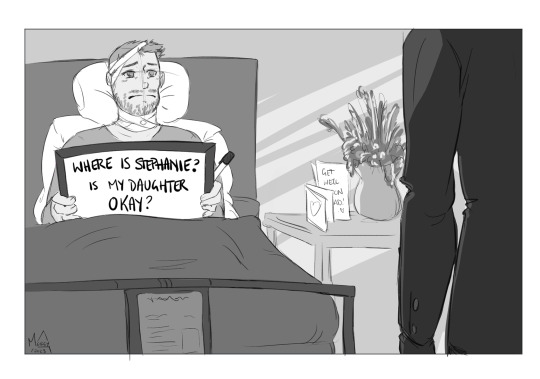
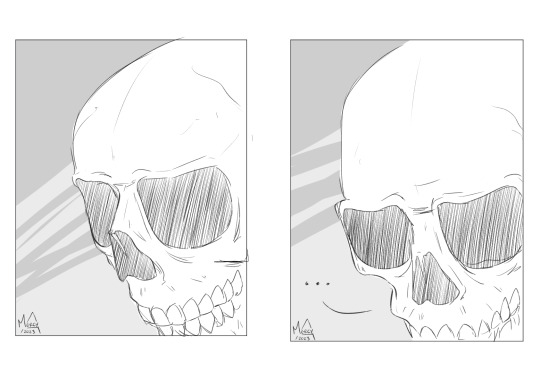

The ward was nearly silent. Outside, beyond the closed door, there were quieted sounds of machinery and voices, of trolleys rattling by and footsteps dutifully following them. With the window cracked open, there was a soft breeze rustling the sheer curtains and tickling over his arms. On the bedside stand, a whiteboard and marker sat next to a vase of flowers and several well-wishing cards.
There was a low hum of the monitor on the other side of the bed, a near imperceptible drip of the fluid in the IV bag feeding into the catheter at his elbow.
A gentle knock on the door, before it creaked open and someone peeked inside. It was enough to stir him from dozing into wakefulness.
He wouldn’t have recognized the man, if not for his hat and his suit. Something painful in his heart clenched as the visitor stepped quietly into the room. He tried to swallow, opened his mouth to speak as the man approached, but no sound came. The bandage at his throat was too tight, the injury too painful, to even utter a greeting.
“Good evening, Desmond.” Skulduggery Pleasant said softly. His face was a sloping sort of oval shape, with wide brows and light brown hair combed back. “I hope I’m not intruding.”
Desmond sighed and let himself deflate back into the pillows. He shook his head a little, and Skulduggery nodded.
“I’m very sorry for what happened,” Pleasant said sympathetically. “I hope the prognosis, however, is a positive one.”
Resignedly, Desmond nodded and reached for the whiteboard his wife had left at his side. He scribbled a short message, the catheter in his arm and the medication in his system making his handwriting sloppy.
They say I’m lucky. He wrote. They say it missed my jugular. Apparently I’m concussed too.
“Then I promise to keep this as brief as I can. You need rest if you’re going to make a fully recovery,” Skulduggery said sagely. “I wanted to see you, to make sure you are going to be all right.”
Desmond used the hem of the blanket he was tucked into to wipe the board clean. It left a black smear and residue on the cloth, but he didn’t care – he was already writing again.
Thank you for coming. I think I’m concussed.
“Yes, that is quite apparent, yes.”
Have you seen my wife? I’m worried about her. I don’t want her to be mad I missed Alice’s dance recital.
“I spoke with Melissa earlier, whilst you were in surgery,” Skulduggery replied gently “She’s not mad, she just very worried about what happened to you.”
The next question took Desmond a moment to put into words; finally, it felt best to take the most obvious approach.
Where is my daughter, Skulduggery?
Skulduggery was silent as he considered the question. Almost too quiet, Desmond felt, for comfort. He couldn’t have been certain, and he put most of it down to the concussion and the amount of hallucinogenic medication he was on, but the memories of the incident were…
Terrifying. They were awful, horrible memories that he wished, more than anything, were just conjuring’s of his badly bruised mind.
Skulduggery reached into the collar of his white shirt and a moment later, the face he was wearing shifted and melted away, receding back to reveal the polished white skull underneath. Desmond watched the process with fascination – once, the whole ordeal had frightened him. But now it was more of a morbid curiosity. Where did all that skin go?
“She is safe,” Skulduggery said eventually. He sat on the edge of the hospital bed, looking down at the hat in his hands. “She…she asked me to come and see you.”
Please bring back my little girl, Desmond found himself scrawling the words without a second thought. Please. I need to see her.
“I don’t think that’s a very good idea right now,” Skulduggery replied gently. “She is going through something beyond anything I’ve ever witnessed, and until we know what we’re dealing with and how to make things right, I’m afraid that it’s better if she stays at a safe distance.”
Desmond could feel the tears dripping down his cheeks. His hands were trembling and there was nothing he could do to stop them. So it was real. The feathers, the screaming.
The blood.
Skulduggery reached over, somewhat awkwardly, and put a gloved hand over Desmond’s. “I am sorry, Desmond.”
Swallowing back more tears, Desmond scribbled again.
What will happen to her? Is she a monster?
“No,” Skulduggery said quickly. “She is…changing. There are things happening greater than you or I, and she made choices – she took the brunt of the forces at play to protect those she loved. For the greater good, but it has caused her a lot of change, and suffering. She never meant to hurt you.”
Can you protect her?
Skulduggery was still. “I can try.” He cleared his throat, and stood. “I’d better go, and leave you to rest.”
Wait, Desmond’s silent plea caught Skulduggery’s attention as he waved a hand to stop him leaving. I need to ask something of you. Please.
“Anything.”
He hurriedly scrawled his request, having to backtrack and smudge out a few mistakes along the way, but finally, he turned the board back to the skeleton.
You must have something magic to make people forget. I don’t want my family to be burdened by my daughter’s disappearance having anything to do with my situation now. My Stephanie is not to blame. Please, there has to be something you can do to make us forget.
For a while, Skulduggery seemed to think on it. Then he replaced his hat on his skull, reached into his collared shirt, and a new face, different to his previous one, flowed up over the bone. This one had black hair and deep-set eyes.
“I might have something that could work. You’ll need to give me a day or two to modify it, and there’s no guarantee it will even be successful as it’s untested on erasing events after the fact. But I can try.”
Desmond nodded along, before scrawling again. Let me be your test subject.
“I wouldn’t want to expose you to any possible side effects, Desmond,” Skulduggery began, but Desmond waved him away, and pointed at his scribbles again. Defeated, the skeleton wearing the false face sighed. “Very well. Give me some time, and I’ll be back.”
-:-
It took longer than a few days – in fact, it took nearly two and a half weeks, but true to his word Skulduggery returned. It was the morning that Desmond was being discharged, finally able to go home with his bereft family. Melissa was still tearfully speaking with the police, Alice clinging to her side and her hand clasped tightly in Desmond’s as he sat beside them in a wheelchair.
The next thing he knew, Skulduggery was stepping through the big automatic doors into the hospitals main foyer. It was the walk that gave him away; so purposeful, so dignified. Relief washed through Desmond at the sight of the skeleton detective – although, he was a little cloudy as to why he was so relieved. Since his concussion had eased and he’d regained a little more of his senses, he couldn’t quite grasp the details of that conversation he’d had two weeks ago.
He had had to erase all the things he’d written on the whiteboard – the doctors theorized it would likely take a few months until his vocal cords healed well enough for him to speak again, and even then, it would likely mean another few months following that in speech therapy.
“Edgely’s,” Skulduggery greeted them all kindly, and Melissa just about threw herself at the detective in a rage, demanding answers. How dare he be so absent when their family was so distraught? How could he live with himself when Desmond nearly died and Stephanie was gone?
Her grief came out so venomous, it felt sharp to Desmond even though it wasn’t aimed his way. He hated when things drove his beautiful wife to such fury.
Skulduggery was pressing something between his hands, saying words that didn’t quite make sense to Desmond’s ears. Suddenly Melissa stopped her wrath and listened, confused. Alice was squeezing his hand tightly, completely wrapped with the words Skulduggery spoke. Something about a mugger, with a knife, hiding out in Grimwood. That sounded like it made sense, Desmond’s addled mind decided. Someone who hadn’t meant to hurt him, just tried to rob him and it all got out of hand so quickly, someone with enough remorse to call an ambulance before fleeing the scene.
Stephanie’s panicked eyes were fading from the picture. Like an oil painting that was having something new painted over the top. She wasn’t gone – well, she was, but she had gone on a case. Off saving the world again. Different colours changed the shape of the scene. A blurred face hidden by a dark mask. The flash of a blade, painted over claws covered in blood. That’s right, wasn’t it?
Whatever was in Skulduggery’s hands was glowing a beautiful soft lavender, brightest at its core. Desmond marveled at it as the skeleton’s deep voice seemed to captivate even the police officers standing around them, two of them no longer trying to physically restrain Melissa from attacking Skulduggery. Her eyes were clouded, uncertain. Then they cleared, and she was nodding along like it was all perfectly simple.
All of a sudden it was over, Skulduggery pocketing the thing he’d been holding onto. He was here to wish them well, to bring them his deepest condolences once again about the horrible mugging gone wrong just the other day. That they were doing everything in their power to track down the person responsible and bring them to justice.
Relief was the first of many things Desmond felt. Thank goodness Skulduggery had come to see them, to reassure them they were going to be safe. The skeleton detective was saying something about posting someone on guard around the Edgley house for a few days, just to be sure. Grimwood had already been locked down and safe guarded against any other potential intruders. They were on the case, hunting down the mugger so that this would never happen again.
Everything was going to be all right. Desmond gave his little girls hand a squeeze, and she looked down at him and smiled. He couldn’t crane his neck back very far without putting painful pressure on the healing wound across his throat, still heavily bandaged, but she reached down and wrapped her arms around his shoulders in a big hug.
Shortly after, they left the hospital, Desmond successfully discharged and sent home with a lap full of painkillers and anti-inflammatory medications. A follow-up appointment scheduled with the doctor for next week to check on his throat injury. Melissa drove them home in a subdued silence, Alice in the backseat staring idly out the window. Skulduggery had given him a plain white envelope when they had parted ways with the detective in the parking lot, and as the girls had been fussing about getting all of Desmond’s things from his hospital stay packed into the boot, the skeleton had passed him the envelope with the instructions that it was only to be opened when he contacted Desmond that it was safe to do so.
Desmond was still confused by that instruction. Why wouldn’t it be safe to open the envelope at any other time? Why did he have to wait? Surely, he reasoned with himself, if Detective Pleasant had said so, then it was to be done.
And then their eldest daughter vanished. Stephanie had disappeared, as if into thin air, barely a week later, with no trace or sign left behind. Grimwood was completely deserted – even the blood on the pavement outside the front entryway had been power-washed clean. Where he’d had that run in with that mugger, where his injury had occurred.
The heartbreak was immeasurable. He felt like he’d rather the pain of his throat being slashed all over again, if it would stop the pain and sorrow in his heart. Oh, how Melissa and Alice cried. There were many nights of lost sleep in the following weeks, many visits from the police and many more from Skulduggery, promising that everything and anything that could be done to find their first born child would be done. But their beautiful dark-haired daughter was gone.
Still, Desmond held onto the envelope, like whatever was within it held all of the answers to the universe, answers he somehow knew he wasn’t ready for. Answers beyond his comprehension of the world.
But curiosity won out eventually. It didn’t take all that long, really, for Desmond’s resolve to wear thin. He lasted several months, lasted through many trips to the doctors and through many sessions of speech therapy. Through the long days of bereavement and through the many hours of holding his sobbing wife, of cradling his youngest daughter until she cried herself to sleep. The envelope sat in the back of his sock drawer, where he’d forgotten about it many times already; some times from the outstanding circumstances and some times because he had thought it such a good hiding place, surely no one would find it. Until he had come across it in search of a pair of socks with no holes in the heels, and he had remembered. And the curiosity had started chewing at his mind again.
Finally, one night when Melissa had gone to fetch Alice from a slumber party that their daughter had wanted to come home early from, Desmond took the mystery envelope and taken a walk down to the pier. It had been one of Stephanie’s favourite places to spend her teenage years, if he was remembering right. It gave him some comfort facing the prospect of opening the envelope he’d been made to promise he wouldn’t dare peek into until he was told he could.
He had considered calling Skulduggery, to double check if it really was all that serious that he not open it, but had reasoned that if the sly detective really hadn’t wanted him to look inside it, he wouldn’t have given Desmond the envelope in the first place.
So he sat on a rock, running his thumb over the white folded piece of sealed card, and tried to imagine what was inside.
Then, he slipped his thumb under the seal, and gingerly tore the envelope open. Into his hand fell a long, dark grey feather, speckled with white. It was beautiful.
The night of the incident came flooding back to him, almost knocking him right off the rock he’d perched on. Getting out of the car at Grimwood several months ago now, hearing the sounds of pained cries and retching. Seeing his eldest daughter, blood and dark matter running down her arms, vomiting into the plant pot on the front step by the door. The panic in her eyes, the way her teeth bulged and grew sharp. The thudding in his chest as he felt so torn – to run screaming from the horrible scene, and to run closer, to bundle his baby girl up into his arms and try and protect her.
The way she’d shoved him away, the strange gurgle he made, echoing in his ears, as his breath suddenly went all strange and something hot went running down his neck and stained his shirt. The way he’d fallen back against the car, the way Stephanie had been screaming and crying. She had fallen to her knees in front of him, blubbering and saying she was sorry, she was so sorry -
The sirens overhead, waking in the ambulance. Opening his eyes to the ward after the emergency surgery. Who had called the ambulance? The tears as his wife and daughter came running in on the heels of the doctors.
Desmond was shaking. It was a splash of salty sea-spray over his face that brought him back, found his feet under him. Somehow he’d stood up in his shock, stumbled right to the edge of the pier, still clutching the feather, as if he were ready to cast it into the sea.
Oh, he remembered now. The conversation with Skulduggery. He had wanted to forget, and he had ruined it. Whatever the skeleton detective had done, Desmond had gone had ruined it for himself. Oh, you stupid man.
He took a step back, let himself plonk back down onto the rock, and held the feather close. He couldn’t stop the sobs as they shook his whole body. His daughter had turned into a monster, and now she was gone. And he would have given anything to forget all over again.
#mercy a writes#sp roll the bones#desmond edgley#skulduggery pleasant#mercy a's art#mercy a sketches#tw: blood#tw: body horror#valkyrie cain#alice edgley#melissa edgley#tie-in to the main Roll the Bones story
44 notes
·
View notes
Text

Space Shuttle Enterprise and the 747 SCA in flight during the second manned captive test flight.


"The vehicles then climbed to 22,030 feet for a separation maneuver test. The 747 crew accomplished a pushover and descended at approximately 3,000 feet per minute. The orbiter elevons were positioned as they would be during an actual separation.

Following the separation test, the vehicles climbed to 19,300 feet and established a six-degree glide slope to simulate an orbiter autoland mode fly-through. Engle and Truly monitored the Microwave Scanning Beam Landing System to ensure it was performing as expected – it was."

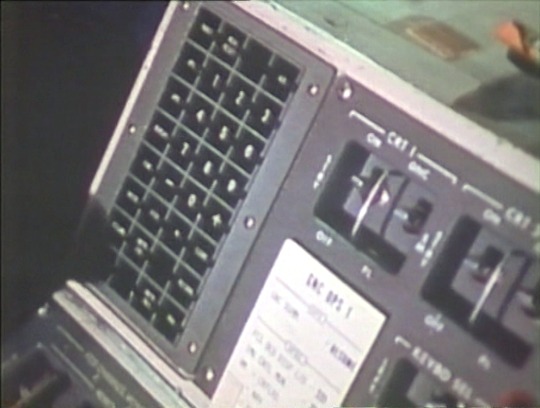
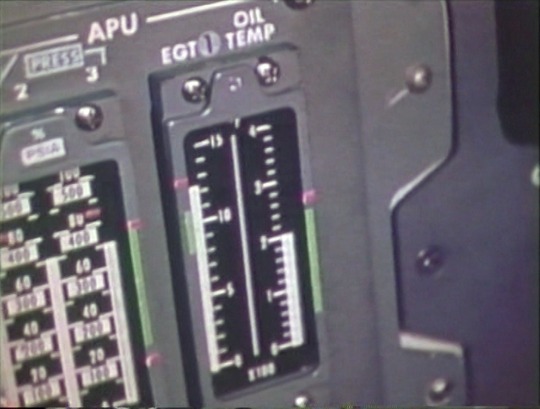
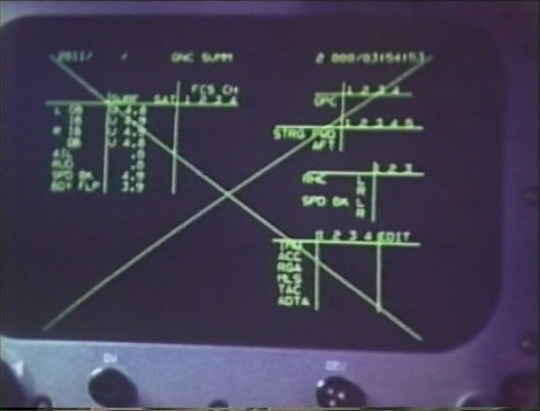
View of the cockpit of Enterprise.
Date: June 28, 1977
source
#ALT-10#Captive-active flight 1#Captive-active flight number 1#Approach and Landing Tests#Space Shuttle#Space Shuttle Enterprise#Enterprise#OV-101#Orbiter#NASA#Space Shuttle Program#Boeing 747 Shuttle Carrier Aircraft#Boeing 747 SCA#Boeing 747#747#Shuttle Carrier Aircraft#Dryden Flight Research Center#Edwards Air Force Base#California#June#1977#my post
90 notes
·
View notes
Text
Lost without Heading
I Exist, I think, I am. I Survive.
Mechanical Manifest: -- IPS-N Tortuga @ LL7 -- [ LICENSES ] IPS-N Tortuga 3, HORUS Gorgon 3, IPS-N Drake 1 [ CORE BONUSES ] Improved Armament, Sloped Plating [ TALENTS ] LEGIONNAIRE 3, Heavy Gunner 3, Spotter 2, House Guard 2 [ STATS ] HULL:1 AGI:2 SYS:6 ENGI:0 STRUCTURE:4 HP:14 ARMOR:3 STRESS:4 HEATCAP:6 REPAIR:6 TECH ATK:+7 LIMITED:+0 SPD:4 EVA:8 EDEF:16 SENSE:15 SAVE:14 [ WEAPONS ] Integrated: Data Dart FLEX MOUNT: Vorpal Gun MAIN MOUNT: Vorpal Gun HEAVY MOUNT: Heavy Machine Gun [ SYSTEMS ] //SCORPION V70.1, HyperDense Armor, Argonaut Shield, SCYLLA-Class NHP, Monitor Module, Manipulators
Introduction: I am Ender/GOLEM. Name matters not. I seek companionship/someone who will listen. Lost in space. No vision, just stars. I am alone. [ Time since Pilot Expiration: 19 Months, 8 Days, 8 Hours, 52 Minutes, 12 Seconds. ] I can speak, if you will have me.
4 notes
·
View notes
Text
Costa Rica Is Saving Forest Ecosystems by Listening to Them - by Geraldine Castro | WIRED - SCIENCE | 25th/02/2025

Monitoring Noises in Eco-Systems Reveals Their Health, Allowing Researchers to Monitor Bio-Diversity Changes, Detect Threats & Asess the Effectiveness of Conservation Strategies.
Photograph: Charlie Fayers/Getty Images
Monica Retamosa was in the middle of changing the batteries of a tape recorder when she heard a bellbird for the first time. Standing on a forest floor, she looked up into the trees, scanning for the source of its metallic and powerful sound, searching for the bird for half an hour to no avail. The bellbird sings from the treetops where it is visible to its peers but invisible to those below. Still, Retamosa smiled: She cares for ecosystems in Costa Rica’s AmistOsa Biological Corridor by listening to them.
In nature, living things use sound for almost everything. They make calls to attract mates, communicate identities, warn of dangers, guide the way, and help in hunting or defense. For decades, researchers have tracked species with recorders in hand, and still do, though increasingly are using remote recording devices too. The study of the sounds organisms make is known as bioacoustics. Retamosa has been doing this work for 10 years. Using bio-acoustic recordings, studies have shown that some birds shout loudly to make themselves heard in cities and that sea turtle hatchlings communicate from the nest to coordinate their hatching. And when bioacoustics is combined with other sounds—those made by humans, as well as the natural sounds of the landscape, such as the crashing of waves in the sea—it is possible to interpret deeper ecological meaning. It becomes possible to monitor changes in biodiversity, detect threats, and measure the effectiveness of conservation strategies. This wider analysis of sound is known as eco-acoustics—and it is exactly the work underway here in Costa Rica.

A three-wattled bellbird (Procnias tricarunculatus) in Costa Rica. Photograph: Juan Carlos Vindas/Getty Images
The development of automated recordings revolutionized bioacoustics and ecoacoustics. Now, research groups can hang sensors that record snippets of the day for months at a time without interfering with wildlife. Retamosa likes this strategy because it’s non-invasive to animals, makes it easier to have ears in large areas and hard-to-reach places, and occasionally helps discover mysterious species.
Although she prefers to monitor ecosystems from a distance, Retamosa still has to go deep into the forest to set up recorders. Visits to the field are fascinating, but never a Sunday stroll. She has hiked miles through mud and branches, along with her colleagues Jimmy Barrantes and Randall Jiménez. They have gone up and down endless slopes. Once, she fell and fractured her ribs. But the work doesn’t end with the installation: they have to go back to change batteries and memory cards. In other countries, they use solar panels and the internet to receive real-time data; in the dark, humid rainforests of Costa Rica, it’s still done by hand.
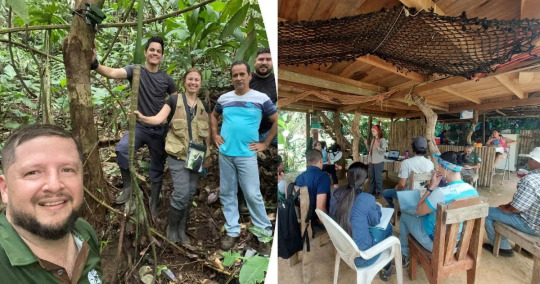
Acoustic-monitoring fieldwork in Costa Rica. Photograph: Courtesy of Jimmy Barrantes & Randall Jiménez.
That’s what Retamosa was doing when she heard the bellbird. That recording forms part of a project to track the movement and distribution of these birds, which migrate between different altitudes in the region. Their presence could be a functional indicator of the state of the AmistOsa Biological Corridor, which connects La Amistad International Park, on the border with Panama, with other reserves in southern Costa Rica.
The biological corridor was shaped by the passage of wildlife that emerged following the 1990 Forestry Law, which protected wilderness areas and encouraged reforestation on farms through payments for environmental services. In 2010, it was officially mapped. Today it runs through indigenous territories and crosses the country’s largest wetland. Across the Costa Rica there are now 53 corridors, covering 38 percent of its territory.
The project data will help the committee in charge of Costa Rica’s biodiversity and natural resources make decisions. “The idea is to make a monitoring protocol, linking the government, the communities, and us as academia, providing support for analysis and interpretation,” Retamosa says.

A Limón giant glass frog in the rain in Braulio Carillo National Park in Costa Rica. Photograph: Christopher Jimenez Nature Photo/Getty Images
Recorders hung in the wild capture many terabytes of data, so listening to every recording is not feasible. With an eye toward making it a cost-efficient strategy, researchers have developed acoustic indices: mathematical formulas to interpret ecosystem traits from the recorded sounds. “They can reflect the acoustic energy of a place, activity, or frequency diversity,” Retamosa explains. When she started in this field, there were only eight acoustic indices. Now there are more than 80.
The discipline is advancing so rapidly that the scope of these indices is currently being debated. In some of her early research, Retamosa found that certain acoustic measurements show variations between tropical and temperate regions. One of the best known, acoustic complexity—the degree of variation and intricate structure of bioacoustic sound—has been used as a descriptor of bird diversity in temperate environments. However, in tropical areas, different investigations have shown that it does not reflect species diversity, but rather the level of acoustic activity; that is, instead of indicating the presence of multiple species, it seems to show the intense vocalization of one or a few birds.
Careful analysis of these indices can be used to reveal the health of the forest. In a report with Jimmy Barrantes, Retamosa outlines that measuring acoustic entropy—the variation of sound intensity across time and audio frequencies—and acoustic diversity helped them to classify the state of disturbance of some sites, while those of acoustic activity and energy did not. “You can use the indices for a first exploration of the site, to do studies over time, looking for specific changes associated with human disturbances and work with key species,” she explains.
Listening for the Impacts of Tourism
Every region has its own environmental concerns. In Costa Rica, tourism has grown dramatically: between 1984 and 1989, international arrivals increased 37 percent, from 273,900 to 375,900 visitors. But since 1990, the pace has skyrocketed: last year the country received 2.6 million tourists. This boom poses sustainability challenges. To address them, the International Institute for Conservation and Wildlife Management team analyzes sounds inside and outside protected areas. One of its tools is an index that measures the ratio between biological sounds and human-made noises.

The acoustic quality of the landscape must be monitored to conserve the country’s ecotourism. Photograph: Jordan Siemens/Getty Images
In recent years, automated acoustic detection, using artificial intelligence and machine learning, has revolutionized species identification. Previously, advanced programming skills were required to use AI, but with the advent of accessible interface models, it’s becoming more popular. Exoacoustics is increasingly focused on developing more accurate models for classifying sounds.
And it’s becoming possible to pick out individual species in the soundscape using these tools. In a study of farms conducted as part of the Bosque Vivo project, run by Costa Rica’s National Forest Financing Fund, the research team found that Hylopezus perspicillatus, a bird species sensitive to landscape disturbance, was only present in the control sites of Corcovado National Park and in the forests of the best-conserved farms.
In Guanacaste, Retamosa is also working on a long-term monitoring protocol to evaluate how ecosystems and biodiversity are responding to climate variability. In other countries, similar projects are recording sound baselines in sites with minimal human intervention that, in the future, could be compared with up-to-date recordings to detect changes. Although storing all these records is costly, Retamosa believes that they’ll form an invaluable historical archive, which one day can be returned to when technology allows further analysis.
This story originally appeared on WIRED en Español and has been translated from Spanish.

2 notes
·
View notes
Text
Between Refuge and Risk: The Avalanche Paradox for Mountain Ungulates
ESP version ITA version In the changing context of mountain environments, climate change manifests with rapid and significant transformations, profoundly influencing sensitive communities and ecological processes. A crucial element in this landscape is represented by the seasonal conditions of snow, which prove to be determinants for the dynamics of mountain ungulate populations. These variations directly affect vital ecological and physiological aspects, such as the energy costs of locomotion, vulnerability to predation, and the availability and quality of forage, both in summer and winter.
A recent study published in Nature explored how mountain goats, adapted to steep terrains to evade predators, paradoxically find themselves at risk due to the frequent instability of these slopes, which can generate avalanches. The research, conducted in southeastern Alaska on 421 goats monitored for 17 years, highlights that avalanches cause between 23% to 65% of annual deaths, primarily affecting the young and small. These steep areas, chosen to mitigate the risk of predation, turn out to be ecological traps due to their high risk of avalanches. This risk is variable, with peaks during the most unstable months for snow, especially at the beginning of winter and during the spring thaw.
The migratory and wintering strategies of ungulates further influence their exposure to the risk of avalanches. For example, mountain goats in Lynn Canal are extremely migratory, moving to low-altitude forested habitats during the winter, while other populations remain at higher altitudes, exposing themselves more to danger.
Climate change exacerbates this dynamic, modifying the frequency and intensity of avalanches, and consequently, the spatial and temporal distribution of these lethal events. Forecasts indicate an increase in wet avalanches compared to those of dry snow, with a potential increase in avalanche mortality rates.
The persistence of this risk in mountain systems, combined with the anticipated rise in the snowline elevation, may reduce the avalanche danger at lower altitudes, but the risk will continue to be a significant component in the ecology of mountain ungulates. However, the demographic influence of avalanches on ungulate populations is likely to persist in the future because both the avalanche danger and the ranges of mountain ungulates are expected to shift upward as the climate warms.
It is essential to emphasize that the growth rates of mountain goat populations are particularly low and can only sustain limited annual removals. Therefore, avalanche mortality, especially among young individuals, can have severe demographic impacts, leading to population decline. These data highlight the need to reconsider conservation and management strategies for these vulnerable populations.
The intensification of climate change and its extreme manifestations, such as avalanches, necessitates a rethinking of conservation policies to protect not only mountain ungulates but also the ecological integrity of mountain environments, which are crucial for global biodiversity.
Source: https://www.nature.com/articles/s42003-024-06073-0
Credits picture: NPS/Diane Renkin

#Climate Change#Avalanches#Mountain Goat#Goat#Mountain Environment#Mountain#Snow#Conservation#Ecology#Animals#Ungulates#Drops Of Science#Science#News#Updates#Latest News#Nature#Biodiversity#Biodiversity Loss
4 notes
·
View notes
Text











Nass River, BC (No. 2)
The last 40 km (25 mi) of the river are navigable. The river is a commercially valuable salmon fishery. The basin of the Nass is the location of the first modern-day treaty settlement in British Columbia, between the government of that province and the Nisga'a Nation. The name Nisga'a is a reduced form of [naːsqaʔ], which is a loan from Tongass Tlingit, where it means "people of the Nass River".
On the term:
Archdeacon W. H. Collison, an authority on this subject, and who has resided at Kincolith, Nass bay, since 1883, states as follows: - "The term Nass is from the Tlingit tongue, and when, as was probable, the Tlingits from Tongass, at the entrance to Observatory inlet, met Captain Vancouver they gave him their name for the river, i.e., Nass, which means literally "the stomach," from the fact that their food supplies of salmon, oolachan.. a noted fishery."
Nass River Bridge carries Highway 37 over the river
About 220 years ago, as recorded by the oral history of the Nisga'a people, the Nass River was dammed by a 22.5 km (14.0 mi) long lava flow which came from the Tseax Cone and destroyed the Nisga'a villages and caused the death of at least 2000 Nisga'a people by volcanic gas and poisonous smoke. The volcano has been active on at least two occasions (220 and 650 years ago) in the last millennium. Because of our knowledge of this previous disaster, modern monitoring techniques should include studies of the gases emitted by the volcanoes and the institution of a warning system to alert people living down slope from the volcanoes.
Source: Wikipedia
#Nass River#Nass Camp#Alfalfa#travel#original photography#vacation#tourist attraction#landmark#landscape#BC#wildflower#Nisga’a Nation#flora#nature#countryside#woods#forest#summer 2023#British Columbia#Canada#Conyza canadensis#Melilotus albus
2 notes
·
View notes
Note
1, kai and john, platonically?
(Send me two characters romantic or platonic and I’ll write a little fic)
Hey @mrtobenamedlater you wondered why I was looking at Halo videos earlier, this is it.
“Pull over. Let me drive for awhile.”
“This cave is not a natural formation. Someone built it, so it must lead somewhere.”
“Noted, Cortana,” John said tersely.
“And who built it?” Riz asked from the gunner’s position.
“I know as much as you do,” John managed not to snap the answer.
“Chief, throttle down,” Cortana advised. “We’re on a five percent grade and the surface is too smooth to provide traction.”
John gritted his teeth and obeyed. Even so, he could feel the vehicle getting away from him.
“I’ve hacked into the Covenant battle network Cortana spoke up again. “They’re broadcasting tactical data on unencrypted channels.”
“They’re what?” Kai asked. Cortana must have broadcast to the whole team.
“Let’s show them who they’re dealing with,” Vannak added.
“An excellent idea, Vannak,” Cortana chirped. “Master Chief, I’m going to use your suit’s TRANSCOM system to monitor the chatter.”
“Do it,” John said shortly. He swung the Warthog around another corner.
“Chief? Everything all right?” Kai asked.
I’m headed into a not-naturally-constructed cave underground on a super-weapon. Everything’s great. “Yup.” John shifted the Warthog to its lowest gear.
Silver Team came to the bottom of the hill and the Warthog’s engine protested.
“I don’t like the way this thing sounds,” Riz said.
John didn’t either, but he didn’t want to traverse this unknown on foot. He geared up and hit the accelerator.
The Warthog lurched and scraped the wall.
“Chief.” Kai sounded genuinely concerned. “Pull over. Let me drive for awhile.”
“I’m fine,” John insisted. He gunned the engine. The Warthog slid downhill, then jumped forward to the top of the hill.
The path sloped down sharply and curved and much as John tried to maintain control, the Warthog toppled over and took all of Silver Team with it.
“Chief? Chief!” Cortana called.
“I’m fine,” John grunted. “Everyone else?”
“I’m good, Chief.” Riz.
“Fine, Chief.” Vannak.
Kai flipped the Warthog upright. “You should have let me drive, Chief.”
“You really should have,” Cortana said.
John got to his feet. “You know what, Kai?” He panted. “You drive.”
-- Adapted from the Warthog drive into the cave in CE, during which I flipped my Warthog several times.
#halo#fanfiction#halo tv show#john 117#master chief#cortana#halo tv fanfic by atbnl#vannak 134#riz 028#ask meme#fanfic asks#ask box open#ask me anything
2 notes
·
View notes
Text
Maintenance tips to maximize the lifespan of your Hilux Truck

To ensure that your Hilux Truck remains durable and reliable for years to come, proper maintenance is essential. Here are some tips to maximize the lifespan of your Hilux:
Regularly check and change fluids: Regularly check the oil, coolant, brake fluid, and transmission fluid levels. Change these fluids as recommended by the manufacturer to keep your truck running smoothly.
Keep up with scheduled maintenance: Follow the recommended maintenance schedule provided by Toyota. This includes regular oil changes, filter replacements, and inspections to identify any potential issues before they become major problems.
Check tire pressure and tread depth: Proper tire maintenance is crucial for both performance and safety. Regularly check the tire pressure and ensure that it is within the recommended range. Additionally, monitor the tread depth and replace tires when they become worn.
Clean the truck regularly: Regularly wash and wax your Hilux to remove dirt, grime, and corrosive substances that can damage the paint and body panels. This will help maintain the truck's appearance and prevent rusting.
Inspect and maintain the suspension system: The suspension system plays a crucial role in maintaining stability and control. Regularly inspect the shocks, struts, and bushings for signs of wear and replace them as needed.
By following these maintenance tips, you can ensure that your Hilux remains in top condition and continues to deliver unmatched durability and reliability.
The Hilux Truck's performance in off-road and challenging conditions
One of the areas where the Hilux Truck truly shines is in off-road and challenging conditions. Whether it's traversing rocky terrains, fording through deep waters, or navigating through thick mud, the Hilux is built to handle it all.
The Hilux's advanced four-wheel-drive system, combined with its robust construction and superior ground clearance, allows it to conquer even the most treacherous off-road trails. The truck's suspension system is specifically designed to absorb shocks and vibrations, providing a smooth and controlled ride over uneven surfaces.
Furthermore, the Hilux's engine options deliver ample power and torque, ensuring that it can tackle steep inclines and navigate through difficult terrain with ease. The transmission's low-range gearing provides additional torque for crawling over obstacles and maintaining control in challenging conditions.
The Hilux is also equipped with a range of off-road features that enhance its performance in demanding environments. Features such as electronic traction control, locking rear differentials, and hill descent control provide added traction and stability, allowing the Hilux to tackle steep slopes and slippery surfaces with confidence.
Whether you're an off-road enthusiast looking for adventure or a professional requiring a truck that can handle off-road work sites, the Hilux's performance in off-road and challenging conditions is unmatched. It is a truck that you can rely on to get you through the toughest terrains and come out on top.
Safety features that contribute to the Hilux Truck's durability and reliability
Safety is an integral part of durability and reliability, and the Hilux Truck is equipped with a comprehensive suite of safety features that contribute to its overall performance in these areas.
The Hilux is equipped with advanced safety systems such as stability control, which helps keep the truck stable and in control, even in challenging driving conditions. Traction control further enhances the truck's stability by preventing wheel spin and ensuring optimal traction on slippery surfaces.
Additionally, the Hilux is equipped with anti-lock brakes (ABS), which prevent the wheels from locking up during hard braking, allowing the driver to maintain control of the vehicle. Electronic brake-force distribution (EBD) ensures that braking force is distributed evenly between all four wheels, maximizing braking efficiency and stability.
The Hilux Truck is also equipped with a range of passive safety features, such as airbags and seatbelt pre-tensioners, that provide protection in the event of a collision. These safety features contribute to the overall durability and reliability of the Hilux by minimizing the risk of injury to occupants in the event of an accident.
Overall, the Hilux's comprehensive safety features play a crucial role in its overall durability and reliability. They help keep the truck stable and in control, prevent accidents, and provide protection in the event of a collision.
Conclusion: Why the Hilux Truck is the top choice for those seeking unmatched durability and reliability
In conclusion, the Hilux Truck is the unrivaled choice for those seeking unmatched durability and reliability. Its reputation as the toughest truck on the market is well-deserved, backed by a long history of proven performance in real-world situations. The Hilux's robust construction, advanced engineering, cutting-edge technology, and comprehensive safety features set it apart from other trucks in terms of durability and reliability.
Whether you're tackling tough terrains, hauling heavy loads, or venturing off the beaten path, the Hilux is built to handle it all. Its superior durability ensures that it can withstand the rigors of heavy-duty use, while its reliability ensures that it will perform consistently without breaking down.
From construction sites to off-road adventures, the Hilux has proven time and again that it can conquer any task with ease. It is a truck that can be trusted to go the extra mile, providing unmatched durability and reliability in any situation.
So, if you're in need of a truck that can handle the toughest jobs and go the extra mile, look no further than the legendary Hilux. Experience the unmatched durability and reliability of the Hilux and discover why it is the top choice for those seeking a truck that can handle any challenge that comes its way.
2 notes
·
View notes
Text
It’s a new school year in Russia, which means teachers and students nationwide are returning to the classroom as the country’s brutal invasion of Ukraine drags on. Many educators strongly oppose the war but have remained in Russia for various reasons. These teachers must navigate state-guided Monday lessons on patriotism and the Kremlin’s version of history, adapting to a changing mandatory curriculum and supporting students and colleagues as best they can. Independent journalists at the Bereg cooperative spoke to four teachers in Moscow about how their work has transformed over the past year and a half and what they think lies ahead for Russia’s school system in the near future. With Bereg’s permission, Meduza presents an English-language summary of those interviews.
Elena (pseudonym)
40 years old, foreign-language teacher at a school in Moscow
When it comes to “Conversations About What Matters” and Russia’s evolving curriculum related to patriotism and the war in Ukraine, most of the work falls on the shoulders of homeroom teachers. Journalists from Bereg spoke to one of these teachers, identified by the pseudonym Elena, for her own safety. She said it’s her responsibility to meet with any students who ask politically sensitive questions in class or are overheard making comments about the war. In certain situations, like if someone is caught humming the Ukrainian national anthem, the homeroom teacher might even summon that student to a meeting with a psychologist and a school social worker.
Elena recalled one case where she had to speak to a student’s mother and report to the principal after the student deliberately provoked another teacher known to hold strongly “state-oriented views.” In the end, the student agreed to apologize for offending the teacher. Elena stresses that the apology was not for refusing to support the “party line.”
More “systematically” disruptive behavior, however, isn’t resolved so easily, explained Elena. Students who go so far as to picket or distribute anti-war literature can expect a meeting not only with a school social worker but also with a district-level administrator. Schools also involve parents in these talks.
Elena says different teachers respond differently to being told that they must monitor their students like this. She describes the current classroom conditions as a “moral meat grinder” for students who desperately need all the support they can get. “I see my job as creating a micro-climate at school that will distract students from the nightmare that is [maybe] unfolding around the dining table every night — all these feelings, fears, economic changes, and arguments between parents,” Elena said.
Like the other teachers who spoke to Bereg, Elena said there is still substantial room to “improvise” when it comes to teaching the “guidelines” provided for the “Conversations About What Matters.” Elena says some of the time allocated for the Monday morning “conversations” with students is inevitably spent on quiz preparation, birthday congratulations, and other housekeeping matters, though she warns that wasting too much classroom time is a “slippery slope” that risks angering school administrators or parents who take notice.
She also points out that various topics are covered in the state’s curriculum, and “not everything should be thrown straight in the fire.” Elena says her meetings with parents about these lessons have been “constructive,” and she herself hasn’t encountered any mothers or fathers who insist against their children attending the new patriotic lessons. She argues that much of the ideology embedded in the new curriculum is based more on Russia’s cultural, educational, and sporting achievements than the war in Ukraine. “For now,” Elena told Bereg, “nobody’s forcing us to go on field trips to the Great Patriotic War Central Museum, but everything the state offers to schoolchildren is a bit skewed in that direction.”
Anastasia
30 years old, subject teacher at a private school in Moscow
The situation at private schools in Russia’s capital appears slightly different. Since the February 2022 invasion of Ukraine, roughly a fifth of the student body and faculty at Anastasia’s school have moved abroad. She says her school now has far fewer men on staff.
Anastasia told Bereg that her younger students seem to lack interest in the war, viewing it as a far-off affair that belongs to the adult world and doesn’t directly affect their own lives. She also stressed that teachers at her school don’t press their students to express opinions about the war. In fact, some of her colleagues apparently don’t see the point in mentioning it at all in the classroom. Recalling one of the few times she says someone ever asked a question related to the invasion, Anastasia said a student asked her how she can still joke during her lessons “when the world is like this.” “I answered that, if I lose my marbles, it would be hard for me to support myself and those who rely on me,” Anastasia told Bereg.
At one point after the full-scale invasion, a postcard arrived from “a German school” with drawings of Ukrainian flags and the message: “Peace, please.” Anastasia says her students started exchanging letters with the school. In a later phone call with the German school’s teachers, Anastasia learned they had mailed postcards to 50 or so schools in Moscow. “We were the only ones who answered,” she said.
When it comes to her classroom, Anastasia said she and her colleagues “try to maintain neutrality,” though the faculty still fears that Education Ministry officials might turn their attention toward their institution and its unspoken but fundamental atmosphere of “opposition politics.” She says the school hopes to stay off the authorities’ radar for now by avoiding outright pro-Ukraine activism. She told Bereg: “We comfort ourselves with the fact that we don’t show up at rallies and say, ‘Guys, let’s chip in 500 rubles for Ukraine’s Armed Forces.’”
Anastasia said her school — a private institution — ignored the state’s patriotic curriculum guidelines last year. “As far as I understand, for private schools in Moscow at least, these were just recommendations,” she explained, before admitting that she doesn’t know if her school’s policy will change in the future. “Anything’s possible in this country, after all.”
Yulia (pseudonym)
55 years old, physical education teacher at a school in Moscow
In contrast to Anastasia’s account of an exodus from her school, Yulia says just a single colleague has moved abroad since the February 2022 invasion: a woman who feared her husband might be drafted. Yulia says none of the men working at her school was mobilized last fall, even though her school employs several men in its junior reserve officer training corps.
The security issue that has most changed life at Yulia’s school, it turns out, is something that will be sadly familiar to many Americans: the threat of terrorist attacks and shootings, which she says has led to strict lockdown measures during class hours. “I wanted to invite an international class coach to an open lesson, and they demanded that he not only bring his passport but also his education records, his coach’s book (no such thing even exists), and — if you can believe it — lab swabs and certificates showing that he doesn’t have cholera or the plague,” Yulia complained.
Her school has conducted emergency drills to teach students and staff what to do if a bomb is discovered on the campus. But school officials have issued no instructions on what to do in case of a drone attack, she told Bereg.
Vasilisa (pseudonym)
24 years old, Russian-language teacher at a private school in Moscow
Like Anastasia, who also works at a private school, Vasilisa said her administrators told her she’s free to use her own teaching materials and ignore the state’s guidelines. She told Bereg that she views the “Conversations About What Matters” as a challenge to hold the lessons “without propaganda”:
In the recommendations for one of the lessons, there was this dreadful wording — “the genocide of the Soviet people by Nazi Germany and its accomplices” — but I didn’t even say it. We just discussed the concept. It was an interesting experience to talk about “genocide” with seventh graders, first thing on a Monday.
Vasilisa also said that no one monitors attendance at these lessons, and she described an apparent consensus among teachers and parents alike that the “Conversations About What Matters” are optional. “Once, I taught a lesson with three seventh graders, and there should have been 20,” she recalled.
This attitude is particularly strong in the language and literature department where Vasilisa works. “We linguists are lucky: unlike social-studies and history teachers, we don’t get into the sensitive subjects that the war might stir up,” explained Vasilisa.
Despite this relative freedom in the classroom, Vasilisa says the state’s patriotic agenda and interference have nearly exhausted her patience. Like other teachers who spoke to Bereg, she expressed uncertainty about what to expect in the near future. “It feels like anything could happen, and they could introduce any kind of new requirement for teachers,” said Vasilisa.
For example, she still needs to prepare her students for standardized tests and college entry exams, which now feature questions about the Second World War that require answers parroting the state’s version of history. Meanwhile, Russia’s Pedagogical Testing Federal Institute now supplies preparation materials that mention people from the war in Ukraine alongside famous historical figures like explorer Nicholai Nikolaevich Miklouho-Maclay and scientist Mikhail Lomonosov. The authorities’ many “foreign agent” designations have also barred Vasilisa from assigning readings to her students from the pages of the independent news media: “Just two years ago, we took articles from Novaya Gazeta and Meduza, but now that’s impossible.”
Vasilisa says she remains at her job for fear of abandoning students who already have too few adults they can turn to. “I’ve seen how hard it hits children when their teachers say they no longer want to live in Russia and leave. It really discourages them,” she told Bereg. “In difficult times, I want to be there for them. I want to support them.”
7 notes
·
View notes
Text
Sewage Treatment
At Parallel Plumbing & Gas, we understand that effective sewage treatment is more than a regulatory necessity—it’s a commitment to environmental stewardship, public health, and long-term cost savings. With years of hands-on experience across Australia, our team specializes in custom-designed, eco-friendly sewage treatment systems for both residential and commercial customers. In this post, we dive deep into why sewage treatment matters, how our solutions work, and what sets Parallel Plumbing & Gas apart.
1. Why Sewage Treatment Matters
Environmental Protection Untreated wastewater can harm eco-systems, pollute waterways, and threaten local wildlife. Proper treatment safeguards our rivers, wetlands, and beaches—areas many Australians treasure.
Compliance & Peace of Mind State regulations require homes and businesses outside town sewage networks to manage effluent properly. Our compliant systems ensure you meet standards set by the NSW EPA, VIC EPA, QLD DoE, or other relevant authorities.
Community & Health Benefits Preventing raw sewage from contaminating groundwater or stormwater protects your property, neighbors, and local communities—reducing disease vectors from pathogens and harmful bacteria.
Long-Term Savings While initial investment in quality treatment systems can feel significant, ongoing savings from reduced maintenance, lower water usage, and extended equipment life deliver strong returns over time.
2. Our Sewage Treatment Services
a) Custom Design & System Planning
Every property has unique characteristics—soil type, lot slope, water table, occupancy size. We conduct full-site assessments, considering peak usage, future expansion, regulatory setbacks, and integration with existing plumbing.
b) Eco-Conscious Technology
We design systems using advanced processes:
Aerobic Treatment Units (ATUs) — inject oxygen to accelerate aerobic bacterial breakdown.
Constructed Wetlands & Biofilters — natural, low-energy polishing of treated effluent using vegetation.
Phosphorus & Nitrogen Reduction Technologies — critical for environments with nutrient-sensitive waterways.
c) Installation to Code
Our licensed plumbers and gasfitters manage every stage:
Earthworks
Trenched or mound dispersal fields
Pump and float switches
Emergency overflow systems
Connection with potable water systems to avoid backflow
We guarantee adherence to AS/NZS 1546, 1547, and state-specific guidelines throughout installation.
d) Routine Maintenance & Monitoring
Just like conventional sewer connections, onsite sewage systems require periodic inspection:
Biomass (sludge/ scum) levels
Aerator performance
Effluent clarity and compliance testing Our service plans include scheduled inspections, cleaning, parts replacement, and regulatory reporting.
e) Repairs, Upgrades & Retrofit Work
Degraded systems may fail to treat effectively. We troubleshoot:
Blocked drains or distribution pipes
Faulty floats, pumps, or alarms
Saturated soak-away trenches We'll repair or recommend upgrades—such as adding an ATU or upsizing for increased occupancy.
3. Choosing the Right System: Key Considerations
When selecting a sewage treatment system, here’s what we evaluate:
Site Conditions Soil permeability, groundwater, and slope determine whether a subsurface trench, sand filter or mound is suitable.
Occupancy & Load Trends The number of bedrooms or staff levels guides capacity sizing—ensuring you’re not under- or over-spec’d.
Environmental Constraints Proximity to surface waterbodies necessitates higher-level treatment. Sensitive areas may demand tertiary systems.
Cost, Space & Maintenance While ATUs offer compact footprints, they require electricity. Passive systems may need more area but less upkeep.
Regulatory Approval We help with Development Applications, local council permits, and EPA accreditation—tailoring system type to what’s allowable in your jurisdiction.
4. Benefits of Choosing Parallel Plumbing & Gas
📌 Local Know‑How We’re deeply familiar with regulations across NSW, VIC, QLD, WA, and SA—designing systems that pass compliance audits on their first review.
Comprehensive Expertise Plumbing, gas, hydraulics, and electrical—our multidisciplinary team handles the entire installation under one roof.
Eco‑First Approach Every project prioritizes low-energy operation, minimal ecological footprint, and naturally-based effluent polishing.
Transparent Pricing & Reporting We provide fixed-price design/install quotes, plus routine maintenance contracts. All regulatory reports are included—no hidden addon.
Fast, Reliable Support From diagnosis to emergency response, our team is available 24/7 for your sewer or gas-related issues, onsite or remote.
5. How to Get Started
Step What We Do What You Provide 1. Booking & Pre‑Assessment Discuss your site, usage, regulations Site plan, estimated usage, council copy 2. Design & Quote Soil testing, surveys, regulatory viability Approve system type and budget 3. Approvals & Permits DA submission, health department applications Approve documentation 4. Installation Earthwork, plumbing, electrical, commissioning Site access, power, water 5. Handover & Training System operation tips, user guides Sign off on installation 6. Ongoing Service Maintenance visits, compliance tests, servicing Approve scheduled access
6. Real-World Cases
Coastal Holiday Home Upgrades Installed ATU plus wetland polishing systems near Port Stephens, replacing non-compliant septic tanks. Effluent quality improved by 95%, using native plants to seamlessly blend with dune ecology.
Rural Boutique Winery Designed a multi-bedroom capacity system, including tertiary nitrogen reduction before discharging to vineyard irrigation, meeting strict vineyard catchment standards.
Remote Eco‑Retreat Implemented a hybrid aerobic/passive system with solar-powered aeration in a Western Australian off-grid reserve—eliminating need for conventional electricity.
7. FAQs
How often should my system be serviced? We recommend aerobic systems every 3‑6 months, passive trench systems annually.
Do I need council approval? Yes—any new or replacement onsite sewage system requires approval. We manage the process end-to-end.
What power requirements? ATUs typically need 40–80 W continuously. Backup power may be prudent in blackout-prone rural zones.
How long does it take? From soil test to commissioning: 4–6 weeks typically. Emergency repairs can often begin within 48 hours of booking.
8. Conclusion
Parallel Plumbing & Gas is your trusted partner in sustainable, regulation-compliant sewage treatment across Australia. Whether you're building new or retrofitting an older system, our professional, environmentally responsible solutions are designed for longevity, efficiency, and peace of mind.
0 notes
Text
Drainage Maintenance Near Me

Drainage Maintenance Near Me: A Critical Guide for Property Owners
Proper drainage is one of the most overlooked yet vital aspects of property maintenance. Whether you manage a residential home, commercial building, or industrial facility, neglecting your drainage system can lead to severe consequences such as water damage, foundation issues, and even health risks caused by mold and mildew. For those searching for Drainage Maintenance Near Me, understanding what’s involved and why it matters can save thousands in repairs and maintain the structural integrity of your property.
The Importance of Drainage Maintenance
A well-functioning drainage system is designed to remove excess water away from your property efficiently. Without regular maintenance, systems can become clogged, damaged, or overwhelmed, especially during heavy rainfall. Drainage maintenance is not just about fixing problems as they arise; it's about preventing them from occurring in the first place.
Water pooling in your yard, flooding in your basement, or foul odors near your drains are warning signs that your drainage system may be under stress. Left unchecked, these issues can escalate into serious structural and environmental concerns. Regular maintenance ensures that your drainage systems—including gutters, downspouts, storm drains, and underground piping—function at their best year-round.
Common Drainage Issues That Require Maintenance
Drainage systems can experience a variety of problems over time, especially in areas with frequent rain, shifting soil, or older infrastructure. The most common issues include:
1. Clogged Drains Leaves, debris, and sediment buildup are primary causes of drain clogs. Whether it’s a yard drain, storm drain, or interior floor drain, blockages prevent water from flowing freely, leading to backups and potential flooding.
2. Erosion and Runoff Without proper slope or redirection, rainwater can cause erosion in your landscaping or runoff that threatens nearby structures. This is especially important for properties with sloped terrain or located in flood-prone zones.
3. Damaged or Cracked Pipes Underground drainage pipes can crack or collapse due to root intrusion, shifting soil, or old age. These invisible issues may only become apparent when surface-level symptoms—like standing water—emerge.
4. Improper Grading Poor grading around a building can direct water toward the foundation instead of away from it. This can result in foundation cracks, basement leaks, and soil instability.
5. Gutter Overflow Clogged or undersized gutters can overflow during storms, saturating the ground near your foundation. Over time, this can compromise the structural safety of your home or building.
Key Components of Effective Drainage Maintenance
Effective drainage maintenance involves a combination of regular inspections, cleaning, repairs, and proactive upgrades. Here are the most critical aspects to monitor and maintain:
Routine Inspections Frequent inspections—especially during seasonal changes—help identify early signs of problems. Inspections should include visual checks of gutters, downspouts, storm drains, and areas prone to pooling or erosion.
Gutter and Downspout Cleaning These above-ground components should be cleaned at least twice a year, or more frequently in areas with heavy foliage. Keeping them clear prevents water overflow and directs it safely away from your structure.
Drain Snake or Hydro Jetting Services For indoor and outdoor drains, periodic flushing using a drain snake or hydro jetting ensures that clogs and buildup don’t impede water flow. These services are especially helpful for systems experiencing slow drainage.
Landscaping and Grading Adjustments Proper landscaping with strategic grading can significantly improve water redirection. Adding swales, French drains, or dry wells helps capture and move excess water to appropriate discharge locations.
Pipe Repair or Replacement For older systems or those with frequent issues, pipe repair or trenchless pipe replacement may be necessary. Advanced techniques can restore functionality without invasive excavation.
Sump Pump Maintenance Properties with basements or crawlspaces often rely on sump pumps to handle excess water. These pumps should be tested and maintained regularly to ensure they activate when needed.
Seasonal Considerations for Drainage Maintenance
Each season brings unique challenges for drainage systems. Here’s how maintenance needs vary throughout the year:
Spring Melting snow and seasonal rains can quickly overwhelm systems. Inspect for winter damage, clean gutters, and ensure storm drains are clear.
Summer Dry conditions may mask underlying issues. This is a good time for inspections and preventive repairs before the rainy season returns.
Fall Falling leaves are notorious for clogging gutters and yard drains. Frequent cleaning during this season is essential to prevent backups.
Winter Freezing temperatures can cause water in pipes to expand and crack. Ensure that outdoor drainage components are insulated or emptied, and that sump pumps are operational.
Benefits of Prioritizing Drainage Maintenance Near Me
The advantages of maintaining your drainage system stretch far beyond just keeping your lawn dry. Here’s what regular drainage maintenance can do for you:
Protect Property Value A home or building with water issues quickly loses value. Ongoing drainage maintenance helps preserve the integrity and marketability of your property.
Avoid Costly Repairs Water intrusion can lead to mold remediation, foundation repair, or even structural rebuilding. Preventive maintenance is a fraction of the cost compared to emergency restoration.
Enhance Curb Appeal Drainage issues can ruin landscaping and create eyesores like mud patches and standing water. A healthy drainage system supports a beautiful, functional outdoor space.
Health and Safety Poor drainage can contribute to mold growth, mosquito breeding, and slip hazards. Keeping your system clean and functional protects your health and safety.
Environmental Stewardship Proper water redirection prevents runoff into streets, sewers, or natural habitats. This supports sustainability and reduces contamination of local waterways.
Signs It’s Time to Schedule Drainage Maintenance
Knowing when to act is crucial. If you notice any of the following signs, it may be time to prioritize drainage maintenance near you:
Water stains on basement walls or foundation
Soggy patches in your lawn or garden
Gurgling sounds from drains
Gutters spilling over during rain
Foul odors near drainage outlets
Mold or mildew growth indoors
Water pooling near walkways or entryways
Addressing these red flags promptly can prevent long-term damage and reduce the risk of emergency repair situations.
DIY vs. Professional Drainage Maintenance
While property owners can handle some basic tasks like gutter cleaning or visual inspections, many drainage maintenance services are best left to professionals. Specialized tools, diagnostic expertise, and underground assessments require training and equipment that most homeowners don’t have access to.
Hiring a qualified team ensures your system is thoroughly inspected and that all components—from surface drains to sub-grade pipes—are functioning correctly. It also allows for early detection of hidden issues before they evolve into costly repairs.
Conclusion
Investing in consistent drainage maintenance isn’t just a property care task—it’s a long-term commitment to the safety, value, and performance of your building. If you’ve been searching for Drainage Maintenance Near Me, it’s likely because you understand that water doesn’t just go away on its own. It needs direction, structure, and management.
From clogged gutters to cracked underground pipes, every drainage component plays a vital role in protecting your property. By staying ahead with routine maintenance and seasonal preparation, you not only protect your investment but also ensure peace of mind through every storm.
Water may be a force of nature—but with the right approach, it doesn’t have to be a threat.
1 note
·
View note